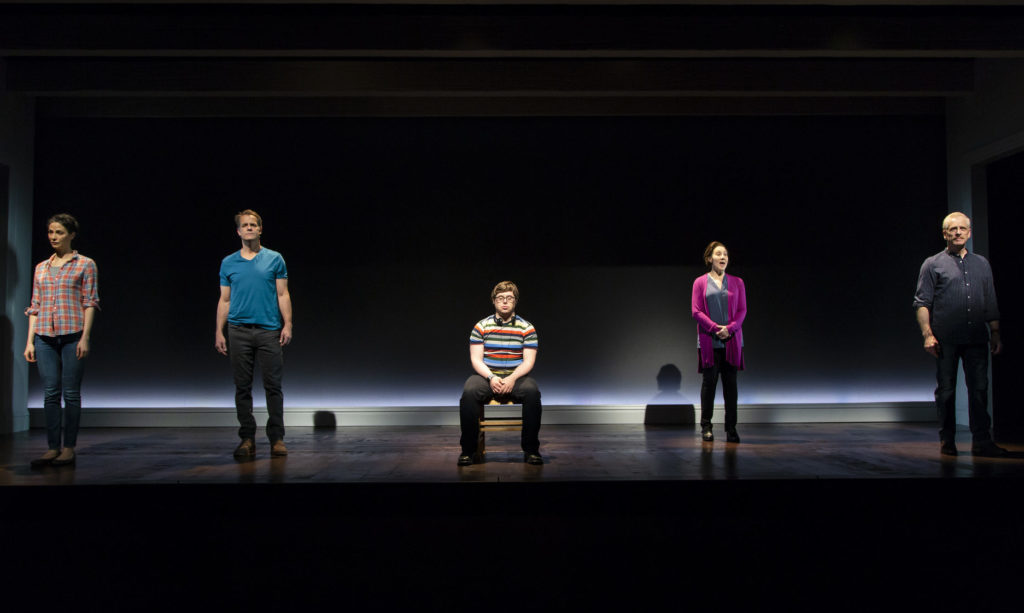
Joanne Kelly, Josh Stamberg, Nolan James Tierce, Joanna Glushak, and John Hikock ©Photo: T. Charles Erickson
Presented by Huntington Theatre Company
By Bernard Weinraub
Directed by Peter DuBois
May 18 – June 16, 2018
South End/Calderwood Pavilion
Boston Center for the Arts
Boston, MA
Huntington on Facebook
Trigger warnings: Ablism, historically-accurate slurs, misogyny
Review by Kitty Drexel
Tokenism
noun/to·ken·ism/ˈtōkəˌnizəm/
The practice of making only a perfunctory or symbolic effort to do a particular thing, especially by recruiting a small number of people from underrepresented groups in order to give the appearance of sexual or racial equality within a workforce.
(Boston, MA) Bernard Weinraub tried so hard to be respectful of the Down Syndrome community. Fall would be a good play about Arthur Miller and Inge Morath if it didn’t fail so hard at including Daniel Miller. Unfortunately, it misses the mark. A lot.
From the Huntington’s website, Fall is summarized thusly: “Renowned reporter Bernard Weinraub explores the fascinating untold story of Miller (Josh Stamberg) and his third wife, photographer Inge Morath (Joanne Kelly), and the divide between their public personas and private lives.” It is set between 1964 and 2005 in Connecticut and New York. The Huntington’s scenic, costume, sound and lighting designers did an excellent job capturing place and time.
Miller might have been the moral compass for American theatre in 1964 but he was also a coward who prioritized his own fears over fatherhood. Stamberg lightly Shatners his way through Weintraub’s script with a Connecticut accent. Kelly gives Morath vitality and joy that contrasts Stamberg’s stoicism sharply. Joanne Kelly does the majority to the emotional heavy lifting because Miller was a true New Englander who expressed his emotions by repressing them.
Weintraub does examine Miller’s marriage to Morath… And to Marilyn Monroe. But, Weinraub does this at the expense of Miller’s son Daniel (played by Nolan James Tierce). The extent of Daniel’s dehumanization is revealed in the summary above – in which Daniel isn’t even named. Despite being central to the plot, Daniel’s inclusion in the script is minimal. Any actor playing Daniel will get minimal stage time, minimal lines, and minimal benefit of the doubt from directors. Anyone who suggests that a character/actor wouldn’t grasp complicated dialogue hasn’t worked closely with the Down Syndrome community. Relevant media sources that prove the capabilities of actors with Down Syndrome include Love You More (Amazon Studios pilot), Glee, and Amy and the Orphans which played off-Broadway through March 2018 (and was brilliant). Or, one could read Tierce’s program bio.
I don’t know Nolan James Tierce but I can empathize with him as a fellow member of the disabled community and performer. Tierce deserves better blocking than standing then sitting, or walking across the stage while a handler watches him from the wings. In the Epilogue, Tierce deserves to speak for his community rather than listen as the abled actors do it for him. If playwrights, et al. don’t include the disabled community in their work about us, really include us as more than mere tokens to display your attempt at trying to be diverse, then your art isn’t actually about us. It’s about your ego.

you tried
That the Huntington chose Fall for its season is understandable. It’s a play that comes soclose to being woke that audience provocation could be assumed. Were the subject Arthur Miller alone, mine would be a far different critique. But, it’s about Miller failing to grasp basic principles of compassion. These days pandering to the disabled community with a token role isn’t enough. To acknowledge that we exist and then severely sideline our role without exposing the audience to our humanity is false inclusion. We, the disabled, will accept nothing less than the rich characters with realistic plot arcs that we deserve. It isn’t enough to offer us a seat at the table anymore. We want to sit at the same table with everyone else while they are also seated.
Tangentially, Fall started at 6:30PM on a Wednesday to a full house. There were many confused wait-listed patrons looking for their seats minutes before the performance started. Staffing can be as frustrating as a retail job during the Christmas season, but the Huntington/Calderwood Pavilion team handled the patrons with poise. While the seated audience grew antsy, the staff remained calm yet firm. Thank you event staff for handling us with such grace.
The Boston Center of the Arts is an accessible space with a functioning elevator. Fall seats patrons on the first and second floors. There is even a gently tilted ramp next to the stairs leading to the bathrooms on the first floor.
Updated 6/1/18: 1. This post incorrectly spelled Mr. Weinraub’s last name in its first publication. We humbly apologize for the error; it has been corrected. 2. BCA staff was incorrectly listed as seating late-comers on 5/30/18. While the BCA staff is excellent, it was the Huntington/Calderwood Pavilion staff that worked with wait-listed patrons at that time. Again, we apologize for the error.
